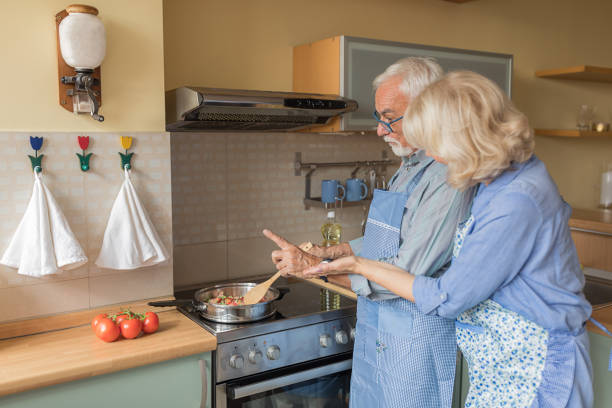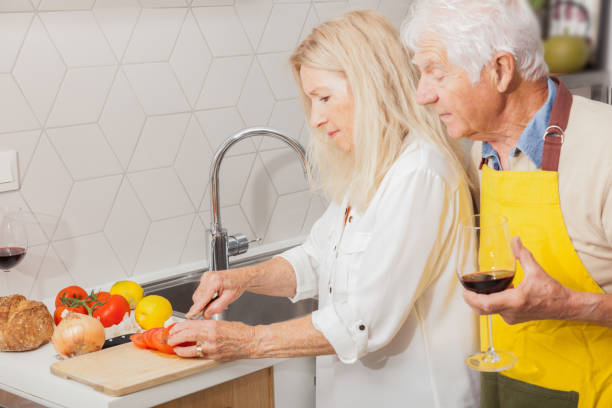As we age, the place we often feel most comfortable is our own home. However, it’s crucial to ensure this environment is safe and secure, particularly when undertaking everyday tasks such as cooking. For seniors, the kitchen can pose a variety of risks, including fire hazards, slips, and accidents.
In this blog, we will provide practical fire and kitchen safety tips specifically tailored for seniors to ensure a safe and enjoyable cooking experience.
Contents
Essential Fire and Kitchen Safety Measures
Before we delve into detailed safety tips, it’s important to understand the essential fire and kitchen safety measures. These foundational precautions act as the first line of defense against potential hazards. They include practices such as maintaining clean and clutter-free cooking surfaces, understanding the proper use of kitchen appliances, and ensuring a functional smoke detection system is in place.
Regularly Check and Update Smoke Alarms
Smoke alarms are a crucial part of any home’s safety measures, particularly in the kitchen. For seniors, it’s essential to ensure these alarms are in good working order. Regular checks and updates should be part of routine home maintenance. Remember, a functional smoke alarm can provide early warning in case of fire, giving precious extra time to evacuate safely.
Be Extra Cautious with Electrical Appliances
Electrical appliances, while making cooking tasks easier, can pose a significant risk if not used properly. Always ensure that appliances are properly switched off and unplugged when not in use. Never use appliances with frayed cords, and consider having a professional install a Residual-Current Device (RCD) for added protection against electrical faults.
Limit the Use of Loose Clothing and Accessories
When cooking, loose clothing and dangling accessories can quickly catch fire. Seniors are advised to wear short or tightly rolled sleeves and avoid wearing loose jewelry when preparing meals. This simple measure can significantly reduce the risk of accidental fires.
Always Have a Fire Extinguisher Accessible
A fire extinguisher is an invaluable tool in case of kitchen fires. Make sure it is easily accessible, and learn how to use it properly. Regularly check that your fire extinguisher is functional and not past its expiry date.
Avoid Leaving Cooking Unattended
One of the most common causes of kitchen fires is unattended cooking. Always stay in the kitchen while cooking, especially when using high heat or when frying, grilling, or broiling food. If you must leave the kitchen, even for a short period, turn off the stove.
Ensure Adequate Lighting
Proper lighting in the kitchen is essential, especially for seniors who may have deteriorating vision. Adequate lighting can prevent accidents related to cuts from knives or burns from hot pots and pans. Consider installing under-cabinet lights for better visibility on countertops.
Keep Flammable Items Away from the Stove
Items such as dishcloths, paper towels, and pot holders can easily catch fire if they come into contact with a hot burner. Keep these and other flammable items well away from the stove.
Install a Carbon Monoxide Detector
While not directly related to fire, carbon monoxide poisoning is another potential kitchen hazard, especially with gas stoves. Install a carbon monoxide detector near your kitchen to alert you to dangerous levels of this odorless, colorless gas.
Practice Safe Mobility
To prevent slips and falls, keep the kitchen floor free of clutter and immediately clean up any spills. Also, arrange your kitchen in a way that commonly used items are within easy reach. This reduces the need for using step stools or chairs to reach high places.
Additional Tips for Kitchen Safety

Besides the essential measures mentioned above, here are a few additional tips to ensure a safe and enjoyable cooking experience for seniors.
Use Oven Mitts or Pot Holders
When handling hot pots and pans, always use oven mitts or pot holders to avoid burns. Remember, seniors’ skin may be more sensitive to high temperatures, making burns more severe.
Have an Emergency Plan in Place
In case of a fire, it’s crucial to have an emergency plan in place. Make sure everyone in the household knows what to do and where to go in case of a fire. Practice this plan regularly.
Keep Children and Pets Away from the Kitchen
To prevent any accidents or distractions while cooking, it’s essential to keep children and pets out of the kitchen. Consider installing a baby gate to keep small children out, and make sure pets are safely secured in another room.
Take Breaks When Needed
Cooking can be physically demanding for seniors. Don’t hesitate to take breaks when needed, especially if you feel tired or lightheaded. Also, consider enlisting the help of a family member or caregiver for tasks that require more physical exertion.
Invest in Easy-to-Use Kitchen Tools
For seniors with limited mobility or dexterity, investing in easy-to-use kitchen tools can make cooking safer and more enjoyable. Examples include one-handed can openers, non-slip cutting boards, and ergonomic utensils.
Conclusion
To sum up, it’s imperative for seniors to remember these crucial fire and kitchen safety measures. Following these practical tips can make a significant difference, turning your kitchen into a safer area and your cooking experience into an enjoyable one. As you age, the importance of safety can’t be underestimated. A safe kitchen is not only a happier one but also a place where you can continue to foster your independence and confidence.

